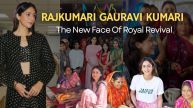By Lavanya Rathore
When most people begin to wind down after 50, Ashu Jain chose to switch gears. At 57, she became a contestant on MTV Roadies, a PhD scholar, a social media content creator with 250K+ followers, and a symbol of what’s possible when you stop waiting and start living. But this reinvention didn’t happen overnight, it was the result of choices, regrets, determination, and unwavering self-belief.
“Right from the start, even when my kids were growing up, I was very communicative. I would talk to them daily, not only about their dreams but also mine, the ones that were left behind,” Ashu recalls. “All the regrets, all the mistakes I made, I used to discuss them. Because every decision has its plus and minus. The career I left, the choice to stay at home, was my own, but the dreams I left behind became my biggest regrets.”

That regret grew louder when her elder daughter left for college. “It hit me hard. Until then, I used to think I’d study further, always in the future tense. But suddenly, I felt that my time had passed. I became emotional. My kids told me, ‘Why not study now? Studying late is better than living in regret.'”
Even though her son was just 10 or 11 at the time, the family rallied around her dream. “When I started working again, people used to say, ‘bin maa ke bachhe’ like motherless children. Our house was already untidy, but it became messier. Meals were basic, but it was a shared decision. We were a middle-class family now supporting the education of not three, but four people. My MTech added to the expensestravel, housing help, everything. But my husband never complained. He was my biggest support.”

Ashu recounts a touching story from her MTech days: “I was revising for an exam when my son, just 11, said he was hungry. I asked him to manage something himself. I kept hearing noises from the kitchen. Later, he came to me with a very odd-shaped paratha. He said, ‘Mumma, I made one for me and one for you.’ That day I knew, it wasn’t just my dream. It was a family goal.”
With her MTech in nanotechnology completed, she considered a PhD. Her marks were good, and she even thought of applying to IIT. “But I was 46 and felt it was too late. I told my husband and he asked just one question: ‘Will it cost us anything?’ I said, ‘No, PhDs are funded.’ He said, ‘Then what’s stopping you? Keep going.'”

Her younger daughter, always her cheerleader, lightened the moment. “I told her I’d be in my 50s by the time I finish. She laughed and said, ‘People already call you half-mad. If they call you fully mad, what’s the harm? We just want you to be happy.'”
Ashu reflects on today’s generation with admiration. “They’re focused. They’ve taught me not to care about societal norms. My lab mates during PhD were my children’s age. Being with them influenced me. When you see their focus, you stop worrying about the small comments.”
Life at home during this phase was chaotic. “Everyone had exams—me and the kids. It felt like curfew at home. No one noticed we were eating the same sabzi thrice a day. Our bonding grew stronger. The struggle didn’t feel like struggle, it felt like togetherness.”
When her husband was working in Guwahati, she lived with her children in a student flat on the IT campus. “Usually married students live alone. I was the only one with three grown-up kids. Initially, we called it a toy house. Later, when they missed comforts, they went back home. So, I stayed at the hostel and they were at home. I’d visit on weekends with a bag full of laundry.”
Ashu speaks of the mixed chaos with humor and warmth. “By the time my elder daughter got married, we had lived many lives in one. She often jokes that people used to say ‘Sharmaji’s son scored this much,’ but in our house it became, ‘Look how much your mother is scoring!'”

On motherhood, Ashu is clear: “Yes, it’s difficult. But it’s fulfilling. I was a stay-at-home mom because I believed someone should be there when kids return from school. Even a grandparent can fill that space, but in a nuclear family, that’s not always possible.”
She praises the hybrid work culture that now allows working moms more flexibility. “When my daughter’s daughter was born, either she or her husband stayed home. With a nanny and remote work, parenting becomes manageable. It’s very possible now. We’ve made asking for help a taboo. But it’s okay to ask. It strengthens family bonds.”
“We stretch motherhood endlessly. There’s no medal for doing it alone. Balance is essential. You can’t be the ‘Mother India’ stereotype and forget your own happiness. That’s where identity crisis begins.”
She shares how her student life lasted from 2011 to 2020, during which all three of her children were preparing for boards, college, and careers. “We all managed. People have made parenting a bigger drama than it needs to be.”
On fitness, Ashu says, “At 20, it’s a gift. At 50, it’s your gift to yourself. I never wanted to give up, even after injuries. I mix Zumba, gym, hikes, whatever my body can handle. I researched that too, overtraining at my age can mess with hormones.”
When she auditioned for Roadies, she admits, “I wasn’t prepared. My intro was flat. The group discussion was worse. I was rejected. It hurt. But I made a reel about it, and it went viral. I got a message to audition in Hyderabad. My husband booked my ticket. This time, I was ready and I got in.
She laughs, “I texted my kids: ‘I’m a Roadie now.’ They were shocked. They said now people will taunt us even more,’ Look at what your mother does!'”

She cleared the interview and task prep but was reminded of her age. “They told me, ‘Getting injured at 22 and 57 is very different.’ I understood. I felt bad, but I was proud. I got selected.”
About the contestants, she says, “They were respectful. But not friends. They didn’t argue with me like they did with each other. That’s where equality was missing. I wanted them to treat me equally, even if that meant arguing.”
Ashu didn’t join Roadies to prove anything to others. “I did it for myself. To inspire people my age. To show that inclusivity matters.”
Her journey into content creation began casually. “I never thought I’d reach a point where brands would send me products. But with visibility came judgment. People said, ‘You did a PhD for this?’ I feel your passion changes with time. What makes me happy today is different.”
Some comments were cruel. “‘Buddhi’, old woman, all this they say. But I don’t feel insulted. I feel blessed to have lived so long, to still have dreams.”

She handles her platform with responsibility. “I don’t promote anything without checking with my doctors or trainers. If I won’t use it, I won’t share it.”
Ashu manages every part of content creation herself, from writing to editing. “Even my family now respects my work. They know not to disturb me during the time where I create my content.”
Vacations are different now. “They’re shooting opportunities too. But I love what I do. It feels good to build something of your own.”
To her younger self, Ashu has a message: “We make the mistake of only planning our early life, education, marriage, and children. We don’t plan our 50s and 60s. That’s the most peaceful, financially stable phase. That’s when you should start anew.”
“Make a bucket list. Think of what you’ll do once your kids grow up. Will you travel? Study? Start something new? That chapter is just arriving, so be ready.”
She adds, “I’ve lived through pain, my back, shoulders, everything. Now I understand how precious the body is. You only get one. Respect it.”
Ashu believes strongly: “The 50s and 60s are your golden period. Not the end. You can go on pilgrimages, hike, learn, grow, it’s all possible. You’re not done. You’re just getting started.”

Today, she says proudly, “I never thought I’d be on TV. I was just cooking at home in 2010. In 2011, I joined college. Retirement wasn’t my end. It was my beginning.”
To everyone still waiting for the ‘right time,’ she says, “The time is now. The Golden Gate is open. You don’t need permission. Take that step. Reclaim your joy.”
And perhaps that is what defines Ashu Jain the most, not reinvention, but reclamation. She didn’t just rediscover herself. She reintroduced herself to the world.











